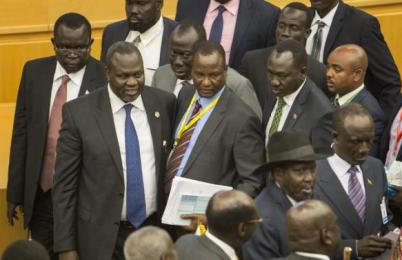S. Sudan rival forces conclude ceasefire workshop without security arrangement deal
September 21, 2015 (JUBA) – South Sudan’s rival parties to the conflict have concluded a one week long ceasefire workshop without reaching consensus over contentious matters to sign a deal and form a joint command as part of the security arrangement.

Armed opposition officials say such arrangement amounts to militarization of the capital in violation of the provisions of the agreement which demands the demilitarization and deployment of joint police.
These divergences of the views about transitional security arrangement at the workshop led to the failure of the armed opposition representatives to sign a deal on the implementation matrix of the permanent ceasefire agreement in Addis Ababa last week because it failed to demilitarize the capital, Juba.
General Dau Aturjong Nyuol, deputy chief of general staff for training and the overall commander of the opposition forces in Bahr el Ghazal region, blamed the government for intransigence at the workshop to reach a consensus to sign a security arrangement matrix on the implementation of permanent ceasefire.
“The team that went to the workshop from Juba was either not ready for a consensus or was not given the opportunity to read the document (peace agreement). If you read the agreement, you find that it is clearly stated that Juba will be demilitarised. It will not have more forces but now these talks of protection force of 5,000 soldiers and 3,000 integrated police. This is not demilitarisation,” General Aturjong, who was part of the leading opposition commanders at the workshop, said on Monday.
He explained during an exclusive interview with Sudan Tribune that demilitarisation means taking the army away from the capital city and not deploying more forces contrary to the provisions of the peace agreement.
However, the senior opposition commander revealed the parties in Addis Ababa, Ethiopia, have agreed on the withdrawal of all foreign forces in the country by October 10, despite disagreement on the nature of the Joint Integrated Police Unit and the number of presidential guards.
The foreign forces targeted and which will now have to leave or stand down include Uganda People’s Defence Forces who were deployed in Juba after the outbreak of fighting in December 2013 to shore up President Kiir’s government under a special arrangement with Uganda’s President Yoweri Museveni.
Others are the Sudanese Revolutionary Forces (SPLM-North) that are also fighting the Khartoum government in Southern Kordofan and Blue Nile and the Dafur-based rebels, the Justice and Equality Movement (JEM), the Sudan Liberation Army-Minawi (SLA-MM) and SLA-AW led by Abdul Wahid.
The agreement however exempts Uganda People’s Defence Forces (UPDF) based in Yambio, Western Equatoria state, because they had been deployed in 2010 as part of the African Union Joint Force to pursue Joseph Kony’s Lord’s Resistance Army.
PRESIDENTIAL GUARDS
On the issue of the presidential guard, the government delegation had demanded 17,000 presidential guards but Riek Machar-led rebel movement rejected the number arguing that it was too high and that the shared presidential guards could be about 2,000 to 3,000.
Observers say the government had taken advantage of the loophole in the Intergovernmental Authority on Development (IGAD) Compromise Peace Agreement which did not give the numbers, leaving it for the partners to negotiate. The earlier proposal had provided that President Kiir retains 265 presidential guards while the first vice-president-to-be Machar was supposed to have 195 guards.
These latest agreements were arrived at a workshop on security arrangement that was convened by IGAD in Addis Ababa from September 13-17.
General Aturjong argued that while the government side believes that the police unit will comprise small group of 1,000 to guard the civilians in Juba only, the rebel movement believes that there has to be a new police body where both sides contribute equally depending on the overall number agreed on.
Speaking to the state owned South Sudan Television on Friday the information minister Michael Makuei Lueth said the government delegation that went to Addis Ababa last week to attend the workshop on the implementation of a permanent ceasefire had returned with information that the rebels had refused to sign the security arrangements but other representatives of former detainees had signed.
“Yesterday (Thursday 18) the delegation that went to the workshop came back yesterday to inform us that the agreement on the implementation of the permanent ceasefire was signed by the government delegation and the former detainee delegation, and the rebels rejected the signing of the agreement. So the ball is now in the court of IGAD and the rebels,” he said.
(ST)
